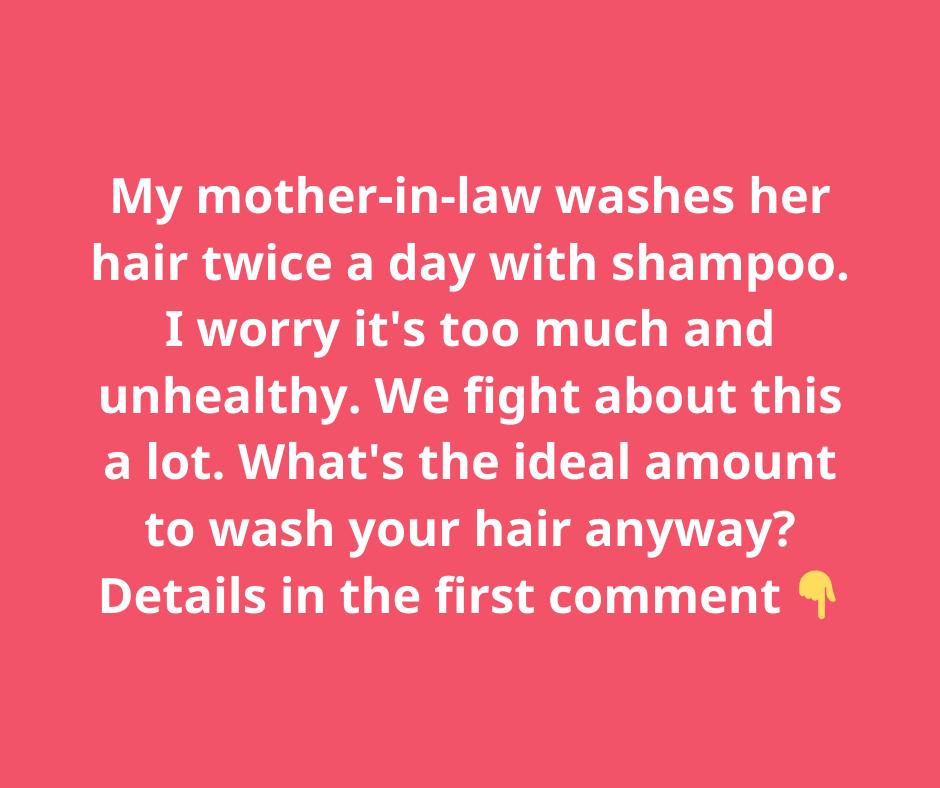Hair washing is a regular part of personal hygiene, but figuring out how often to do it can be tricky. While the idea of washing your hair twice a day for a constant clean feeling may seem appealing, it’s not necessarily the best approach. So, how frequently should you shampoo to keep your hair healthy? Let’s dive into the ideal hair-washing routine based on hair type, lifestyle, and scalp health.

Is Shampooing Twice a Day Bad for Your Hair?
Washing your hair twice a day with shampoo might feel like you’re keeping it extra clean, but it can actually do more harm than good. Here’s why over-washing can become problematic:
- Stripping Natural Oils Your scalp produces sebum, a natural oil that keeps hair moisturized and healthy. Shampooing twice a day strips away these oils, which are vital for protecting your scalp and keeping your hair hydrated.
- Why It’s Bad: Without sebum, hair becomes dry, dull, and more prone to damage like split ends.
- Increased Dryness and Brittle Hair Frequent washing can cause hair to become dry and brittle, making it more susceptible to breakage. Hair needs some natural oil to maintain flexibility and strength.
- Why It’s Bad: Without adequate moisture, hair becomes frizzy, loses its shine, and feels coarse to the touch.
- Disrupting the Scalp’s pH Balance Your scalp has a natural pH level that helps maintain its health and protect against issues like dandruff or acne. Over-washing can disrupt this balance, leading to irritation and other problems.
- Why It’s Bad: An imbalanced pH can cause itchiness, flakiness, and make scalp conditions worse.
- Triggering Excess Oil Production When natural oils are stripped away frequently, the scalp may produce more oil to compensate, leading to a cycle of greasiness.
- Why It’s Bad: The more you wash, the oilier your scalp can get, making you feel like you need to wash even more often.
How Often Should You Actually Wash Your Hair?
The ideal frequency for shampooing depends on factors like hair type, scalp condition, and lifestyle. Here are some general guidelines:
- Oily Hair and Scalp If you have an oily scalp, you might feel the need to wash your hair daily. While that’s fine, try to limit it to once a day. Gradually, your scalp might adjust and produce less oil.
- Best Routine: Wash your hair every day or every other day, depending on how oily your scalp feels.
- Dry, Curly, or Coarse Hair Dry or curly hair needs more natural oils to stay hydrated, so frequent washing can strip it of moisture. Washing two to three times a week is often ideal for this hair type.
- Best Routine: Shampoo two to three times a week, using moisturizing shampoos and conditioners.
- Normal Hair For those with normal hair—not too oily or too dry—washing every other day or two to four times a week is usually sufficient. This keeps hair clean without stripping it of natural moisture.
- Best Routine: Wash every other day or two to four times a week, adjusting as needed based on personal preference and lifestyle.
- Athletes or Heavy Sweaters If you work out regularly or sweat heavily, you may need to wash your hair more often to prevent sweat buildup and scalp irritation. However, rinsing with water after workouts can help remove sweat without using shampoo.
- Best Routine: Rinse with water or use a gentle shampoo after intense physical activity.
Alternatives to Daily Shampooing
If you’re trying to reduce shampoo usage but still want to keep your hair fresh, consider these alternatives:
- Use Dry Shampoo Dry shampoo absorbs excess oil, refreshing your hair without water. It’s a great way to extend the time between washes while keeping hair looking clean.
- Why It Works: It helps manage oil without stripping the hair of natural moisture.
- Rinse with Water On days you skip shampoo, a simple water rinse can help remove dirt and sweat. This light cleansing maintains a fresh feeling without the harsh effects of daily shampooing.
- Why It Works: It gently cleanses without eliminating essential oils.
- Use Sulfate-Free Shampoos Sulfate-free shampoos are less harsh, making them gentler on both the scalp and hair. They clean effectively while maintaining natural moisture.
- Why It Works: Sulfates can be drying, so switching to a sulfate-free formula protects the hair’s natural oils.
Tailoring Your Hair Care Routine
The best hair-washing routine varies for everyone, depending on hair type, scalp condition, and lifestyle. Here are some tips to help you find the right balance:
- Observe Your Hair’s Response Pay attention to how your hair feels after trying different washing schedules. If it’s too dry or flaky, you might be washing too often. If it’s greasy, try adjusting your routine accordingly.
- Experiment with Different Products Different shampoos and conditioners work better for specific hair types. Find products that are formulated for your hair’s needs—whether dry, oily, or normal.
- Consult a Hair Care Professional If you’re unsure about the best routine, seek advice from a hairstylist or dermatologist who can offer personalized recommendations based on your hair type and scalp condition.
Conclusion
Washing your hair twice a day with shampoo is generally not recommended, as it can strip the scalp of natural oils, leading to dryness and damage. The ideal frequency for washing depends on your hair type, scalp condition, and daily habits. By paying attention to how your hair responds, experimenting with products, and consulting professionals when needed, you can develop a routine that keeps your hair healthy and vibrant—without overdoing it.





